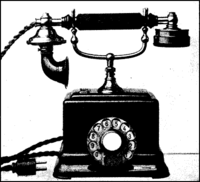Telephony
From Just Solve the File Format Problem
Revision as of 04:51, 11 April 2019 by Dan Tobias (Talk | contribs)
Since Alexander Graham Bell invented the telephone in 1876, it has been a major feature in our lives, evolving from wired "Plain Old Telephone Service" (POTS) to now support a whole range of mobile phone protocols and Internet-based Voice Over IP (VOIP). AT&T introduced picturephones in 1964, but they didn't catch on then; however, various forms of video chatting are now commonplace to accompany traditional voice-only telephony.
- Fax machine
- Media Gateway Control Protocol (MGCP)
- Modem
- Session Initiation Protocol (SIP)
- Telephone numbering
- VOIP
See also Address books and contacts for formats used to store contact lists on mobile phones, and Audio and Music and Video for formats used to store sounds and moving images.
Contents |
External links
Technical documentation
- Bell System Technical Journal archives
- Classic 1960 article on signaling systems
- Bell System Coin Service Manual (1972) - Everything you wanted to know about old-fashioned pay phones
Other info on how phones work
- Dial-up handshaking illustrated
- Why your cell phone doesn't have a dial tone
- Video: Making phone call through 1950s electromechanical exchanges
Unusual phones
- Fences as primitive phone networks
- DIY cell phone
- HOWTO make an intercom out of obsolete corded phones
- 1200-year-old telephone
Other/Misc.
- Interview about phone phreaking
- Cell phone data mining
- Exploding the Phone
- 1990s telecommunications as predicted in 1969
- Meet the Robot Telemarketer Who Denies She’s A Robot
- Adorably Perplexed Kids React to Rotary Phones
- Phone tips from 1965 Woman's National Skateboard Champion
- AT&T Archives: Seeing the Digital Future (1961) (video)
- Why did the PicturePhone fail?
- A Telephone For Your Farm: Answers To Questions About The Rural Telephone Program (1953)
- Evaluating the privacy properties of telephone metadata
